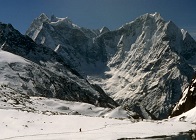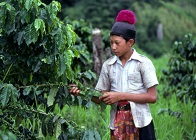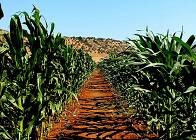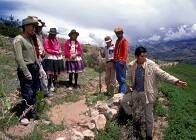
Mountains
Covering around 27 percent of the earth's land surface, mountains play a critical role in moving the world towards sustainable economic growth
Mountains not only provide sustenance and well-being to 1.1 billion mountain people around the world but also indirectly benefit billions more living downstream.
Mountains provide freshwater, energy and food - resources that will be increasingly scarce in coming decades.

Mountain peoples
Mountains are home to 15 percent of the world’s population.
Ninety percent of the world’s mountain dwellers live in developing countries, where a vast majority live below the poverty line and 1 out of 2 faces the threat of food insecurity.
Mountains are places of tourism and cultural trails. Mountain tourism accounts for about 15–20 percent the global tourism industry.
Indigenous and local populations in mountains have unique and valuable local knowledge, traditions and cultural practices that can contribute to effective land management strategies.

Mountains and water
More than half of humanity relies on mountain freshwater for everyday life.
Fresh water from mountains is fundamental for achieving global food security, as it is used by farmers to irrigate crops in many lowland agricultural regions.
Some of the world's largest cities, including New York, Rio de Janeiro, Nairobi, Tokyo and Melbourne, are dependent on freshwater from mountains.

Mountains and energy
Mountains have a key role to play in providing renewable energy, especially through hydropower, solar power, wind power and biogas.
Hydropower currently provides around a fifth of all electricity worldwide, and some countries rely almost exclusively on mountain regions for hydropower generation.
Mountains in regions with a dry or tropical climate hold particular potential for the generation of solar energy.

Mountains and food
Mountains contribute to food and nutrition security by providing land for crops, grazing for livestock, watercourses for inland fisheries, and non-wood forest products such as berries, mushrooms and honey.
Mountain farming has been a model for sustainable development for centuries and is inherently "green" thanks to its small-scale character and low-carbon footprint.
Of the 20 plant species that supply 80 percent of the world's food, six originated and have been diversified in mountains: maize, potatoes, barley, sorghum, tomatoes and apples.

Mountain family farming
Mountain farming is largely family farming as mountain areas, with their dispersed patches of usable land at different elevations and slope conditions, are more efficiently managed by small scale farming.
Most of the production of mountain farming is for family consumption, playing a key role in ensuring household food security.
The production and marketing of high-value mountain products can boost local mountain economies.
Mountain livelihoods tend to be highly diversified and this has proven to be a key to resilience. Some family members may work in agriculture (farming, forestry, aquaculture or animal husbandry) and may be employed on a regular or seasonal basis or even abroad.
